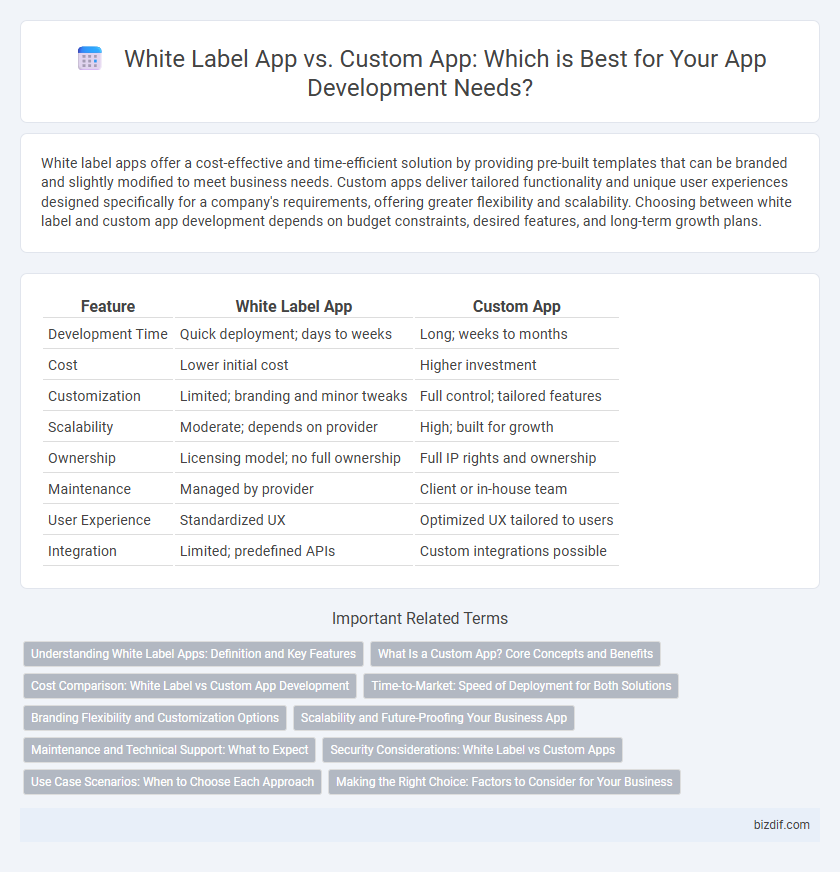White label apps offer a cost-effective and time-efficient solution by providing pre-built templates that can be branded and slightly modified to meet business needs. Custom apps deliver tailored functionality and unique user experiences designed specifically for a company's requirements, offering greater flexibility and scalability. Choosing between white label and custom app development depends on budget constraints, desired features, and long-term growth plans.
Table of Comparison
| Feature | White Label App | Custom App |
|---|---|---|
| Development Time | Quick deployment; days to weeks | Long; weeks to months |
| Cost | Lower initial cost | Higher investment |
| Customization | Limited; branding and minor tweaks | Full control; tailored features |
| Scalability | Moderate; depends on provider | High; built for growth |
| Ownership | Licensing model; no full ownership | Full IP rights and ownership |
| Maintenance | Managed by provider | Client or in-house team |
| User Experience | Standardized UX | Optimized UX tailored to users |
| Integration | Limited; predefined APIs | Custom integrations possible |
Understanding White Label Apps: Definition and Key Features
White label apps are pre-designed software solutions that companies can rebrand and customize with minimal development effort to rapidly launch an app under their own brand. Key features of white label apps include standardized core functionality, scalability, and cost-effectiveness, making them ideal for businesses seeking quick market entry without extensive coding resources. These apps often offer customizable branding elements, integrations, and user interface adjustments while maintaining a consistent backend framework for ease of maintenance and updates.
What Is a Custom App? Core Concepts and Benefits
A custom app is a software solution specifically designed and developed to meet the unique requirements of a particular business or user, enabling tailored functionality and seamless integration with existing systems. Core benefits include enhanced flexibility, superior user experience, and the ability to scale as the business grows. Custom apps also offer improved security and competitive advantages by addressing precise operational challenges and workflows.
Cost Comparison: White Label vs Custom App Development
White label app development typically offers a lower upfront cost by providing ready-made templates that can be quickly branded and deployed, making it an economical choice for businesses with limited budgets. Custom app development involves higher initial investment due to tailored design, unique features, and complex coding, but it delivers a fully personalized product that can scale and adapt to specific business needs. Over time, maintenance and update expenses for custom apps may increase, yet they often provide better long-term value through enhanced functionality and competitive differentiation.
Time-to-Market: Speed of Deployment for Both Solutions
White label apps offer significantly faster time-to-market due to pre-built frameworks and ready-made features, allowing businesses to deploy a functional app within days or weeks. Custom apps require longer development cycles, often spanning several months, as they entail tailored design, coding, and testing processes specific to client requirements. Prioritizing speed, white label solutions excel in rapid deployment, while custom apps provide flexibility at the cost of longer development timelines.
Branding Flexibility and Customization Options
White label apps offer limited branding flexibility with predefined templates, allowing businesses to quickly launch but restricting unique customization. Custom apps provide extensive customization options, enabling tailored user experiences and distinctive branding that align perfectly with business identity. Choosing between white label and custom app development depends on prioritizing speed and cost-efficiency versus full control over design and functionality.
Scalability and Future-Proofing Your Business App
White Label Apps offer rapid deployment and cost efficiency but often lack the scalability needed for long-term growth, limiting customization options as business needs evolve. Custom Apps provide tailored solutions with scalable architecture, enabling seamless integration of new features and technologies that future-proof your business. Investing in a custom app development ensures adaptability to market changes and sustained competitive advantage through enhanced performance and user experience.
Maintenance and Technical Support: What to Expect
White label apps offer streamlined maintenance and technical support managed by the provider, ensuring faster updates and consistent performance but with limited customization options. Custom apps require dedicated in-house or third-party technical teams for ongoing maintenance, offering tailored support that aligns closely with specific business needs. Choosing between white label and custom apps affects the scope, cost, and responsiveness of support services post-deployment.
Security Considerations: White Label vs Custom Apps
White Label apps often present inherent security risks due to shared codebases and limited customization, potentially exposing sensitive data to vulnerabilities. Custom apps, on the other hand, offer tailored security protocols, encryption methods, and access controls specifically designed to meet unique organizational requirements. Enterprises prioritizing data protection and regulatory compliance typically favor custom app development for enhanced security assurance.
Use Case Scenarios: When to Choose Each Approach
White label apps suit businesses needing rapid deployment and cost-effective solutions, ideal for startups or small enterprises aiming to enter the market quickly without extensive development resources. Custom apps excel in scenarios requiring unique features, seamless integration with existing systems, or specialized user experiences, often preferred by large enterprises or businesses with specific regulatory needs. Choosing between white label and custom app development depends on factors like budget constraints, time to market, and the necessity for tailored functionality.
Making the Right Choice: Factors to Consider for Your Business
Choosing between a white label app and a custom app depends on budget constraints, development timeline, and specific business needs. White label apps offer faster deployment and lower costs with pre-built features, while custom apps provide tailored functionality and scalability to match unique brand requirements. Assessing factors like user experience, integration capabilities, and long-term maintenance will help businesses make the right investment for growth and customer engagement.
White Label App vs Custom App Infographic

 bizdif.com
bizdif.com